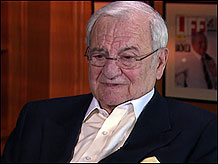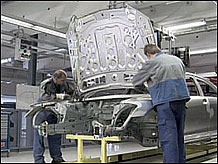Everyone is certain that it's blue skies ahead for Chrysler. Fortune's Alex Taylor asks, Is there less here than meets the eye?
NEW YORK (Fortune) -- The business world was agog. A bold initiative involving Chrysler had just been announced that was going to reshape the automotive landscape. Global expansion was in the wind. A new business model was being created that would make General Motors and Ford (Charts, Fortune 500) look obsolete. Smart businessmen with loads of capital were taking a fresh look at the auto business and bringing ideas to the table about cutting costs and becoming more competitive. A new day had arrived.
That all happened nine years ago when Daimler-Benz merged with Chrysler. Since then, all those bright ideas have gone down the drain -- along with $36 billion of Daimler's money. The linkup that was universally described as a win-win failed to produce the expected payoff because of management inattention, cultural warfare, market shifts, and smarter, quicker competitors.
Now Cerberus Capital Management has purchased an 80 percent stake in Chrysler and will take the company private. It has said little about its plans for the automaker, but, once again, everyone is certain that it's blue skies and clear sailing ahead for Detroit's youngest and smallest automaker. Number One cheerleader CEO Tom LaSorda is out talking to employees about reinvention and the "New American Chrysler." No more boom and bust, LaSorda is saying. Let's all work hard and make it different this time.
Perhaps. But there may an alternate scenario here. After all, Cerberus was the winning bidder for Chrysler, and Daimler (Charts) is effectively paying it to take Chrysler off its hands. So there is a perception out there that Chrysler isn't worth very much as an automaker. Perhaps Cerberus is nothing but a bottom fisher looking for a cheap deal.
So far, Cerberus has said almost nothing about what it plans to do with Chrysler to change things. All it is has talked about so far is what will be the same.
- Cerberus says it will keep Chrysler's managers in place while they execute the latest turnaround plan. Wait a minute? Aren't those the same guys who masterminded last year's big inventory screw-up and brought out such ill-conceived vehicles as the Jeep Commander and Chrysler Aspen?
- Cerberus says it will keep all three of Chrysler's brands. Fine, but how is an auto company whose name is not Toyota (Charts) going to be able to pump enough money into new models to fill three branded channels?
- Cerberus says the union leadership is sympathetic to its takeover. That's good, but the union has made no representation that it will risk an uprising by its members by accepting a sharp reduction in health care benefits. Chrysler may not even get a seat at the table when health care benefits are discussed in contract negotiations this summer. The union usually picks a company with which to negotiate first and GM (Charts, Fortune 500) is considered the likely target.
Here's what we can reasonably guess about Cerberus. It will take an outsider's look at the business, put a sharp pencil to the operations, and move faster and smarter than the Germans could.
It will also be looking for a quick return on the $7.4 billion it is putting into Chrysler - perhaps as quick as three or four years. Quick returns are not what you expect in the auto business, where it takes three or four years just to get a new model into production. So Cerberus will be focused more on the expense portion of the income statement than the revenue part.
Since automotive assets are not exactly yielding top dollar these days, Cerberus' most likely strategy would seem to be to dress Chrysler up for a sale to another automaker - probably a foreign one. Scale still counts and there are numerous companies in Europe and Asia who would like to control Chrysler's market share and distribution network.
Nobody wishes ill of Chrysler. But we've all seen the danger in reading too much into mostly hopeful signs, only to be disappointed later on. The company that invented the minivan, popularized the sport utility vehicle and revived the convertible has had numerous opportunities to put itself on a stable footing over the past three decades and flubbed them all. We should all take a deep breath and relax before saying "it is going to be different this time." ![]()
| |||
|
| |||
|


No comments:
Post a Comment